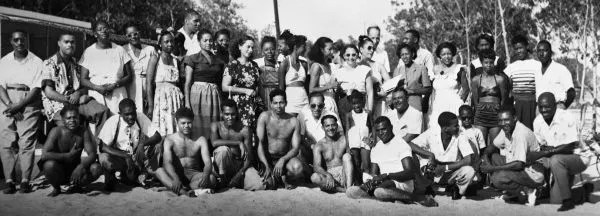
Photo by Ebyabe via WikiCommons

Audio By Carbonatix
When City of Miami commissioners dressed down the board of trustees in control of Miami’s historic Black beach, they pointed to a document that the public could not see to accuse the board of wrongdoing.
Waving around a draft audit of the trust, a document shielded from public disclosure, Commissioners Joe Carollo and Alex Diaz de la Portilla said the Virginia Key Beach Park Trust was poorly managed. Diaz de la Portilla accused the board of malfeasance and said the trustees were “caught with their hands in the cookie jar.”
The city’s auditor general released the final audit report on October 11, giving Miamians a clear picture of the trust’s finances, in place of innuendo.
According to the report, the trust had accounting lapses and failed to follow city code requirements on submitting minutes to the city clerk. While it cites poor bookkeeping, the report does not accuse the trustees of pilfering trust funds.
The city’s auditors reviewed 101 meetings held by the trust between October 2016 and July 2022 and found that none of the meeting minutes from those gatherings were sent to the clerk for record keeping, as required by city code and Florida public records law.
The report found that some expenses, including travel costs and an employee lunch at a Ruth’s Chris Steak House, lacked proper documentation for reimbursement purposes.
Auditors also noted that the trust failed to issue monthly updates on its financial condition to the city and that periodic income statements were often submitted more than a month late. Other accounting and financial issues included reporting revenues from multiple sources in one mixed pot, not explaining the public purpose for certain expenses, and failing to charge event promoters for the park’s employee costs. (The report is attached at the end of this article.)
Guy Forchion, executive director of the park trust, is quick to say that the audit did not support Diaz de la Portilla’s insinuations of trust fund misappropriation.
“When you look it over, there’s no issue of malfeasance. No one’s hand was ‘caught in the cookie jar,'” Forchion tells New Times.

A group gathers at a historical, segregated Black beach on Virginia Key in the 1940s.
Photo by Florida State Archives
Forchion points out that the auditors note that some of the issues have already been fixed. The investigation began in 2019 but was held up by the COVID-19 pandemic in March of 2020, only to be reopened earlier this year. In that time, Forchion says, the trustees have reconciled many of the cited accounting problems. They are currently looking into purchasing in-house accounting software to better deal with bookkeeping.
“We’re doing a whole lot now to make sure we’re doing what the auditors want us to do,” Forchion says.
This newly released report comes just as the city commission prepares for a second reading of an ordinance to remove the current members of the trust and potentially replace them with the commissioners themselves.
Commissioner Christine King pleaded last month to take control of the trust as its chairwoman to get the organization on track, in part to build a Black history museum and cultural complex at Virginia Key Beach. Miami-Dade County has held $20.5 million from public bond funding to construct the museum for nearly 20 years, refusing to release the funds until the City of Miami can prove that it can pay for the museum’s operations.
Commissioners moved to place King as chair of the Virginia Key Beach Park Trust with power over two at-large trustee appointments and to give the rest of the commission the option to assume the remaining positions on the board of trustees. That ordinance must now go to second reading this Thursday, October 13, for it to pass and in effect replace the majority Black board members of Miami’s historically Black beach.